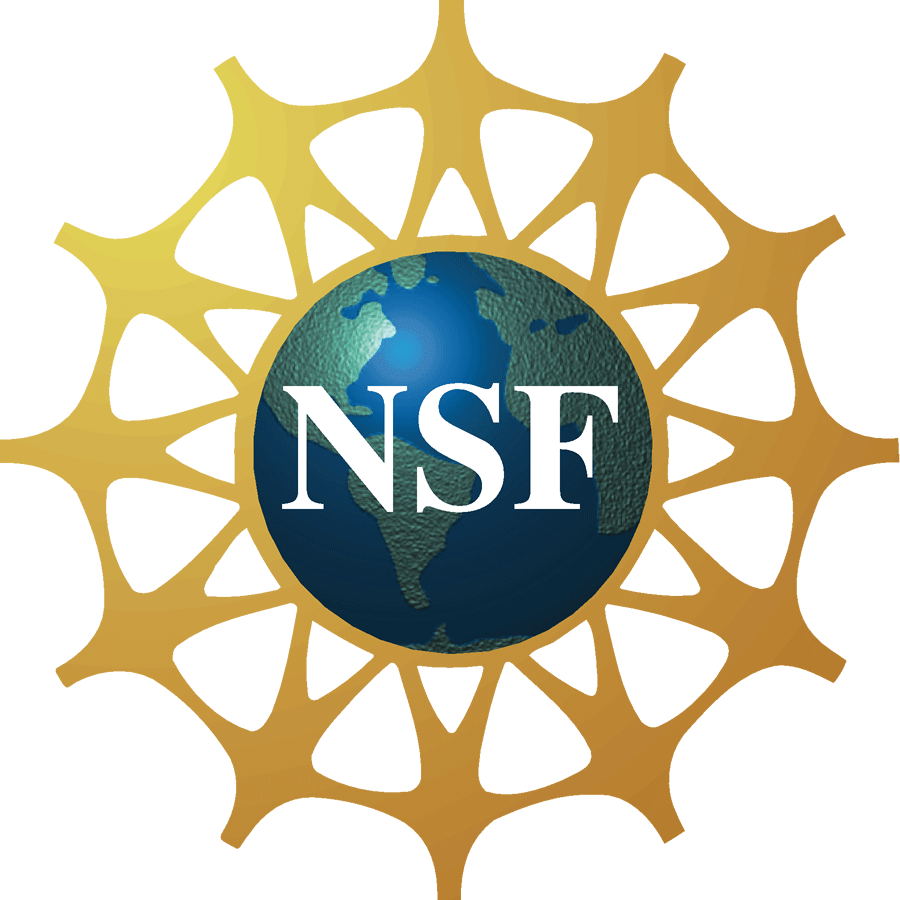General Interest Links
Emotion-Detecting Tech Should Be Restricted by Law - AI Now

A leading research centre has called for new laws to restrict the use of emotion-detecting tech. The AI Now Institute says the field is "built on markedly shaky foundations". Despite this, systems are on sale to help vet job seekers, test criminal suspects for signs of deception, and set insurance prices. It wants such software to be banned from use in important decisions that affect people's lives and/or determine their access to opportunities. Read more ...
Facial Recognition: EU Considers Ban of up to Five Years
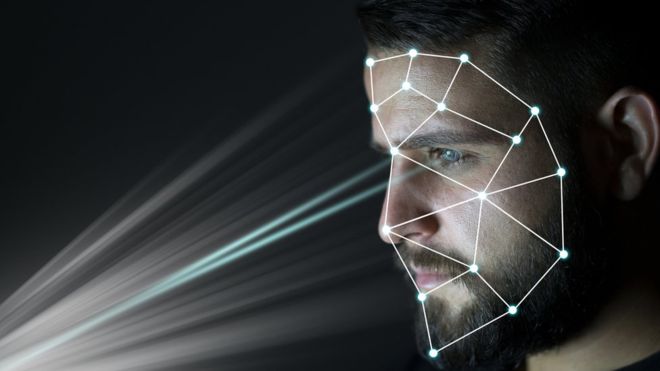
The European Commission has revealed it is considering a ban on the use of facial recognition in public areas for up to five years. Regulators want time to work out how to prevent the technology being abused. The technology allows faces captured on CCTV to be checked in real time against watch lists, often compiled by police. Exceptions to the ban could be made for security projects as well as research and development. Read more ...
A Belmont Report for Health Data
Link recommended by Francisco Guzman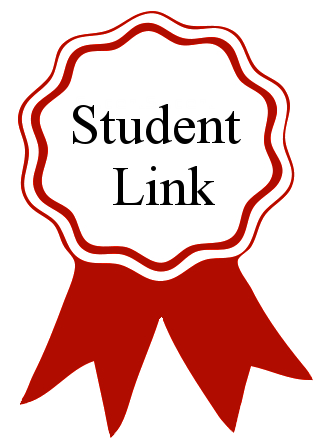
Legal safeguards for health data are limited in scope in the United States. The Health Insurance Portability and Accountability Act (HIPAA) covers identifiable health information held or transmitted by health plans, health care providers and clearinghouses, and their business associates. However, HIPAA doesn’t apply to various other companies or products that regularly store and handle customer health information, including social-media platforms, health and wellness apps, smartphones, life insurers, retailers, credit-card companies, and Internet search engines; HIPAA also places no limits on the use of deidentified data, regardless of who controls the information.1 Beyond coverage limitations, HIPAA doesn’t mandate ethics review for data collection or downstream use. Rather, ethics review is required only if other laws are triggered — specifically, in cases of research on living humans that falls under the Common Rule or research intended to support medical product applications to the Food and Drug Administration. Yet much of contemporary data analytics falls outside these areas — and thus outside mandatory ethical oversight. Read more ...
Ethical Issues in Medical Cannabis Use
Link recommended by Deepa Dhungel
The increasing use of medical cannabis (MC) in the past decade raises several ethical considerations for the clinician. Regulatory issues stem from a gap between MC registration and certification in each country. Professional issues derive from the lack of sufficient knowledge of MC characteristics and the intersection between the physician, the patient and commercial interests. Finally, there are medical and psychological implications which are related to the use of MC regimens. We will discuss these issues in the light of the current era, in which policy has rapidly shifted toward legalization of cannabis, which influences the decisions of both clinicians and patients. Read more ...
Climate Change Science: Adapt, Mitigate, or Ignore?
Link recommended by Emeka Mpanugo
Climate change is real, and the causal link to increased greenhouse emissions is now well established. Globally, the ten hottest years on record have occurred since 1991, and in the past century, temperatures have risen by about 0.6°C. In that same period, global sea level has risen by about 20 cm—partly from melting of land ice and partly from thermal expansion of the oceans. Ice caps are disappearing from many mountain peaks, and summer and autumn Arctic sea ice has thinned by up to 40% in recent decades, although there is some evidence for stabilization. In Britain, usage of the Thames Barrier, which protects London from flooding down the Thames Estuary, has increased from less than once a year in the 1980s to an average of more than six times a year. This is a clear measure of increased frequency of high storm surges around North Sea coasts, combined with high flood levels in the River Thames. Read more ...
Baby DNA Tests Raise as Many Questions as Answers
Link recommended by Deepa Dhungel
Within 24 hours of giving birth to a healthy baby girl, Lauren Stetson grappled with a dilemma: whether to enroll her newborn Cora in a study that would test the baby’s DNA and potentially foresee health issues that her parents might not otherwise discover. Stetson, recovering from childbirth and just getting to know her second baby, was distracted. But her husband, Kyle, a technology enthusiast, listened intently, and they talked it over. The researcher counseled the Stetsons on privacy concerns around genome testing and reminded them they were making a decision their grown daughter could very well disagree with. Unlike most of the families given the choice, the Stetsons said yes — intrigued by the possibility that the exhaustive information gleaned from their daughter’s genes might one day help her. Read more ...
Suicide and Physician-Assisted Death for Persons With Psychiatric Disorders How Much Overlap?
Link recommended by Jennyffer Smith
Physician-assisted death (PAD) of persons in which psychiatric disorders are the basis for the procedure (psychiatric PAD) remains infrequent but rising in number in Belgium and the Netherlands where it is legal, comprising about 1% to 2% of PAD. There were 83 cases in the Netherlands in 20171 (per capita US equivalent would be about 1580 cases). Canada’s euthanasia law generally excludes psychiatric PAD, but there are court challenges to expand the law. Read more ...
Who Makes Decisions for Incapacitated Patients Who Have No Surrogate or Advance Directive?
Link recommended by Syed Sajid Zaidi
Unrepresented patients are those who have no surrogate or advance directive to guide medical decision making for them when they become incapacitated. While there is no perfect solution to the problem of making medical decisions for such vulnerable patients, 3 different approaches are noted in the literature: a physician approach, an ethics committee approach, and a guardianship approach. Recent policies and laws have required an approach that is “tiered” with respect to both who is involved and the gravity of the medical treatment questions at issue. In a general sense, some variant of a tiered approach is likely the best possible solution for jurisdictions and health institutions—both those already with and those without a tiered approach—to the challenging puzzle of treating unrepresented patients. Read more ...
Ethics of Fertility Preservation for Prepubertal Children: Should Clinicians Offer Procedures Where Efficacy Is Largely Unproven?
Link recommended by Jennyffer Smith
Young children with cancer are treated with interventions that can have a high risk of compromising their reproductive potential. ‘Fertility preservation’ for children who have not yet reached puberty involves surgically removing and cryopreserving reproductive tissue prior to treatment in the expectation that strategies for the use of this tissue will be developed in the future. Fertility preservation for prepubertal children is ethically complex because the techniques largely lack proven efficacy for this age group. There is professional difference of opinion about whether it is ethical to offer such ‘experimental’ procedures. The question addressed in this paper is: when, if ever, is it ethically justifiable to offer fertility preservation surgery to prepubertal children? Read more ...
Did Pox Virus Research Put Potential Profits Ahead of Public Safety?
Link recommended by Francisco Guzman
In the brave new world of synthetic biology, scientists can now brew up viruses from scratch using the tools of DNA technology. The latest such feat, published last month, involves horsepox, a cousin of the feared virus that causes smallpox in people. Critics charge that making horsepox in the lab has endangered the public by basically revealing the recipe for how any lab could manufacture smallpox to use as a bioweapon. The scientist who did the work, David Evans of the University of Alberta in Canada, has said his team had to synthesize horsepox because they wanted to study the virus and there was no other way to get it. Read more ...
Nature of Science, Scientific Inquiry, and Socio-Scientific Issues Arising from Genetics: A Pathway to Developing a Scientifically Literate Citizenry
Link recommended by Drew Boagni
The primary focus of this article is to illustrate how teachers can use contemporary socio-scientific issues to teach students about nature of scientific knowledge as well as address the science subject matter embedded in the issues. The article provides an initial discussion about the various aspects of nature of scientific knowledge that are addressed. It is important to remember that the aspects of nature of scientific knowledge are not considered to be a comprehensive list, but rather a set of important ideas for adolescent students to learn about scientific knowledge. These ideas have been advocated as important for secondary students by numerous reform documents internationally. Then, several examples are used to illustrate how genetically based socio-scientific issues can be used by teachers to improve students’ understandings of the discussed aspects of nature of scientific knowledge. Read more ...
The Connection Between Air Pollution and Cell Phones You’ve Never Heard About
Link recommended by Pratik Chettry
In the 21st century, “show me the bodies” seems like a cruel and outdated foundation for public policy. Yet history is littered with examples — like tobacco and asbestos — where only after the death toll mounts is the price of inaction finally understood to exceed that of action. In 19th century England, factory workers’ warnings about crippling lung disease in teenagers working with asbestos were ignored until evidence of the epidemic toll of factory work became overwhelming more than a half-century later. Modern parallels are very much with us. Lung cancer in a young Chinese girl who grew up in polluted urban environment and breast cancer in young women who kept their cell phones in their bras are stunning indications of modern risks where we cannot afford to wait for broader public impacts before reining in exposures. Read more ...
13 Factors To Consider With Smart Home Products
Link recommended by Krish Prahalad

The onset of smart security devices is here and more, and more homeowners are looking to integrate them into their homes to take advantage of delivery services offered by online companies. Online giant Amazon is one such company that offers a smart technology system that allows consumers to have their goods delivered right inside their home, according to a BBC News report. Some say this can thwart thieves from stealing packages, which has become an increasing problem. Others say the technology invades people's privacy and may not be fail-safe. In order for companies to ensure these smart security technologies are safe, they need to take these fears into consideration. Read more ...
Computer science faces an ethics crisis. The Cambridge Analytica scandal proves it
Link recommended by Yumna Ali

CAMBRIDGE ANALYTICA built a weapon. They did so understanding what uses its buyers had for it, and it worked exactly as intended. To help clients manipulate voters, the company built psychological profiles from data that it surreptitiously harvested from the accounts of 50 million Facebook users. But what Cambridge Analytica did was hardly unique or unusual in recent years: A week rarely goes by when some part of the Internet, working as intended, doesn’t cause appreciable harm. I didn’t come up in computer science; I began my career as a physicist. That transition gave me a specific perspective on this situation. That the field of computer science, unlike other sciences, has not yet faced serious negative consequences for the work its practitioners do. Read more ...
Enabling Posthumous Medical Data Donation: An Appeal for the Ethical Utilisation of Personal Health Data
Link recommended by Daniel Bao
This article argues that personal medical data should be made available for scientific research, by enabling and encouraging individuals to donate their medical records once deceased, similar to the way in which they can already donate organs or bodies. This research is part of a project on posthumous medical data donation developed by the Digital Ethics Lab at the Oxford Internet Institute at the University of Oxford. Ten arguments are provided to support the need to foster posthumous medical data donation. Two major risks are also identified—harm to others, and lack of control over the use of data—which could follow from unregulated donation of medical data. The argument that record-based medical research should proceed without the need to secure informed consent is rejected, and instead a voluntary and participa-tory approach to using personal medical data should be followed. The analysis con-cludes by stressing the need to develop an ethical code for data donation to minimise the risks, and offers five foundational principles for ethical medical data donation suggested as a draft code. Read more ...
Patents and ethics: Is it possible to be balanced?
Link recommended by Natalia Paz
In this presentation, principles of ethics are confronted with the desire of the inventor to make a profit. To this end the presentation is focused on patent protection. Patents should guarantee the return of an inventor’s investment and profit and, on the other side, ensure availability – by patent disclosure – of the invention for the society when the patent terminates. Recent patent applications made by inventors are infringing this principle and societies are paying an unexpected price for these practices. Patent claims are too broad and disclosures too poor. Extreme examples will be discussed. Read more ...
Rotten meat and bottled formaldehyde: fighting for food safety
Link recommended by Cristian Rohas
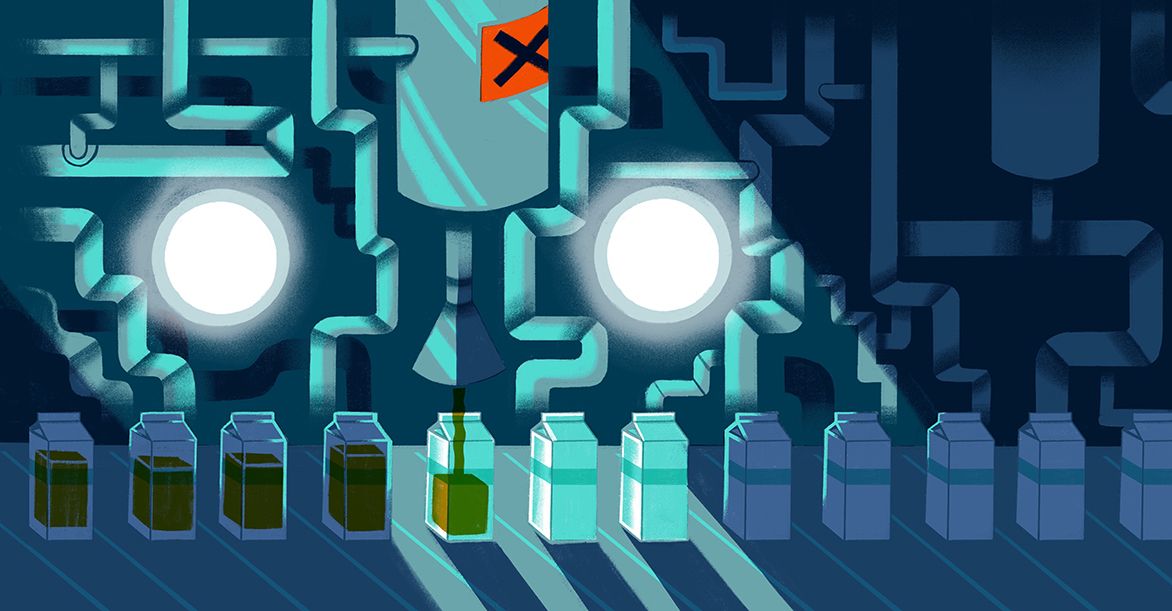
In 1902, the US Congress funded the first controlled trials of food toxicity involving human participants. The chief chemist of the US Department of Agriculture (USDA), Harvey Washington Wiley, was given US$5,000 to investigate how food preservatives and colourings affected health. It was a key moment in a long and ongoing fight to stop industry riding roughshod over the public interest in the supply of food. Wiley recruited young, healthy men as guinea pigs, starting with civil servants. They signed liability waivers and agreed to take part in “hygienic table trials”, eating free but strictly prescribed meals in an experimental kitchen in the USDA’s basement in Washington DC. An excitable press dubbed them the Poison Squad, giving Pulitzer-prizewinning science journalist Deborah Blum the title for her meticulous book tracking the early history of US food regulation. Meanwhile, Marion Nestle, academic scourge of ‘Big Food’, brings the account up to date in Unsavory Truth, her latest withering analysis of industry efforts to corrupt science and dodge regulation. Read more ...
To Whistleblow or Not to Whistleblow: Affective and Cognitive Differences in Reporting Peers and Advisors
Link recommended by Jade Hostetter
Traditional whistleblowing theories have purported that whistleblowers engage in a rational process in determining whether or not to blow the whistle on misconduct. However, stressors inherent to whistleblowing often impede rational thinking and act as a barrier to effective whistleblowing. The negative impact of these stressors on whistleblowing may be made worse depending on who engages in the misconduct: a peer or advisor. In the present study, participants are presented with an ethical scenario where either a peer or advisor engages in misconduct, and positive and the negative consequences of whistleblowing are either directed to the wrongdoer, department, or university. Participant responses to case questions were evaluated for whistleblowing intentions, moral intensity, metacognitive reasoning strategies, and positive and negative, active and passive emotions. Findings indicate that participants were less likely to report the observed misconduct of an advisor compared to a peer. Furthermore, the findings also suggest that when an advisor is the source of misconduct, greater negative affect results. Post-hoc analyses were also conducted examining the differences between those who did and did not intend to blow the whistle under the circumstances of either having to report an advisor or peer. The implications of these findings for understanding the complexities involved in whistleblowing are discussed. Read more ...
Childhood vaccination: should it be mandatory?
Link recommended by Christine Pham

In a better world, vaccine mandates wouldn’t be necessary. Parents would educate themselves about the diseases that vaccines prevent and learn that measles causes pneumonia and brain damage, mumps causes deafness and sterility, rubella causes severe birth defects, pertussis causes suffocation, and human papillomavirus (HPV) causes cervical, oropharyngeal, and anal cancers. They would learn about the remarkable safety and effectiveness of vaccines. And they would learn that although vaccines are not free of risk, their benefits clearly outweigh their risks. Mostly, they would learn that vaccines stand on a mountain of scientific evidence. Well informed: the choice to vaccinate their children would be an easy one. Read more ...
New Study: Abortion after Prenatal Diagnosis of Down Syndrome Reduces Down Syndrome Community by Thirty Percent
Link recommended by Tanooha Veeramachaneni
How many babies prenatally diagnosed with Down syndrome (DS) are aborted in the United States each year? Well, we don’t know. While new data suggesting lower numbers has recently been published, we continue to see most often in print a statistics of 90% – 92%. While that certainly draws attention to the horrifying reality that the majority of children prenatally diagnosed with DS are aborted, it is not accurate. That number relies on a 1999 European study with little data drawn from the U.S. There are good reasons for advocates to use the best data available to raise awareness of the problem that exists in the link between prenatal diagnosis and abortion. Read more ...
Coca-Cola Funds Scientists Who Shift Blame for Obesity Away From Bad Diets
Link recommended by Srujana Lam

Coca-Cola, the world’s largest producer of sugary beverages, is backing a new “science-based” solution to the obesity crisis: To maintain a healthy weight, get more exercise and worry less about cutting calories. The beverage giant has teamed up with influential scientists who are advancing this message in medical journals, at conferences and through social media. To help the scientists get the word out, Coke has provided financial and logistical support to a new nonprofit organization called the Global Energy Balance Network, which promotes the argument that weight-conscious Americans are overly fixated on how much they eat and drink while not paying enough attention to exercise. Read more ...
Weighing the Ethics of Artificial Wombs
Link recommended by Dalia L Lezzar

With 3-D printing, lab-grown organs and lifelike prosthetic limbs, science creeps ever nearer to replicating the parts and functions of the human body. But not pregnancy: Despite several attempts over the past 20 years, researchers have been largely unsuccessful at encouraging human gestation outside the womb, and important elements of the interaction between mother and fetus remain a profound mystery. Recently, however, scientists announced that they had created an artificial womb in which lambs born prematurely grew for a month. Human testing is not expected for three to five years, if it is done at all. Read more ...
Why Doctors Without Borders Refused a Million Free Vaccines
Link recommended by Andrea M Garza Elizondo
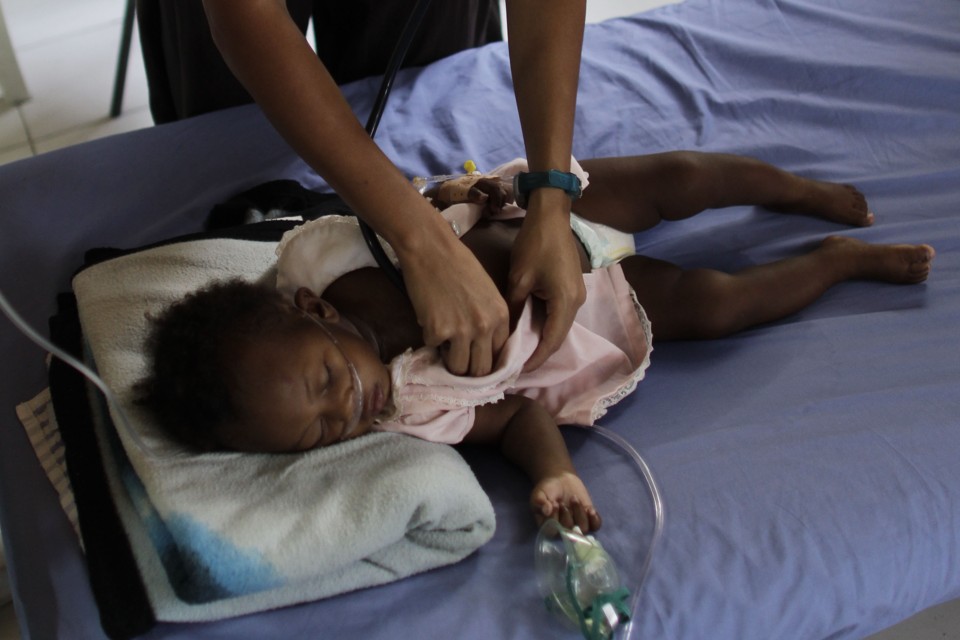
This week the medical-aid organization Doctors Without Borders refused a donation of one million vaccine doses from the pharmaceutical corporation Pfizer. It offered inoculations against a commonly fatal pneumonia—deliverable immediately, to people in need anywhere—and the doctors said no. The decision is the result of a fundamental impasse in modern healthcare. The heart of the refusal—which could well imperil children who would have received those vaccines—is a principled stand against the extremely high cost of many vaccines. Read more ...
‘Blue Whale Challenge’: A Game or Crime?
Link recommended by Vishal Kumar Pallerla
A bewildering range of games are emerging every other day with newer elements of fun and entertainment to woo youngsters. Games are meant to reduce stress and enhance the cognitive development of children as well as adults. Teenagers are always curious to indulge in newer games; and e-gaming is one such platform providing an easy access and quicker means of entertainment. The particular game challenge which has taken the world by storm is the dangerous “Blue Whale Challenge” often involving vulnerable teenagers. The Blue Whale Challenge is neither an application nor internet based game but the users get a link through social media chat groups to enter this “deadly” challenge game. This probably is the only game where the participant has to end his/her life to complete the game. The innocent teenagers are being targeted based on their depressed psychology and are coercively isolated from their social milieux on the pretext of keeping the challenges confidential. To add to the woes, no option is offered to quit the challenge even if the contender is unable to complete the challenge. Blue Whale Challenge in its sheer form could be seen as an illegal, unethical and inhumane endeavor in our present society. The present communication discusses the severe effects of the game on teenagers, the ethical concerns involved and the preventive measures necessary to curb it. Read more ...
What Do You Do When Palaeontology Itself Is Endangered in India?
Link recommended by Vibhu Sharma

There was a lot of excitement when a big fossil was recently discovered in the Kutch region of Gujarat by a team of Indian researchers. However, the very science of palaeontology – the study of fossils to trace the evolution of life on Earth – could be dying in India. Veterans in the field are concerned that there may not be many fossils being unearthed in the future as there are hardly any openings for a palaeontologist in Indian universities, while the number of students signing up for the subject has also been on the decline. Read more ...
The Ethics of Doing Ethics
Link recommended by Andrea M Garza Elizondo
Ethicists have investigated ethical problems in other disciplines, but there has not been much discussion of the ethics of their own activities. Research in ethics has many ethical problems in common with other areas of research, and it also has problems of its own. The researcher’s integrity is more precarious than in most other disciplines, and therefore even stronger procedural checks are needed to protect it. The promotion of some standpoints in ethical issues may be socially harmful, and even our decisions as to which issues we label as “ethical” may have unintended and potentially harmful social consequences. It can be argued that ethicists have an obligation to make positive contributions to society, but the practical implications of such an obligation are not easily identified. This article provides an overview of ethical issues that arise in research into ethics and in the application of such research. It ends with a list of ten practical proposals for how these issues should be dealt with. Read more ...
Scientist Lays Out 5 Huge Problems With Elon Musk’s Hyperloop
Link recommended by Siva Uday Sampreeth Chebolu

A chemist put out a video pointing out huge flaws in billionaire Elon Musk’s proposed high-speed transportation system called the “Hyperloop.” Dr. Phil Mason, a former Cornell University chemist who makes educational videos about science, laid out the Hyperloop’s problems in a 29-minute YouTube video Sunday that already has more than 141,000 views. Musk’s planned Hyperloop would be a long series of six-foot high steel tubes, which air would be pumped out of until reaching near-vacuum pressures. Capsules carrying passengers would then travel through the tube at speeds up to 800 miles per hour, as they wouldn’t be subject to air resistance. Musk’s plans have inspired several different companies to pursue this technology. Read more ...
Female doctors in China: challenges and hopes
Link recommended by Zhihui She
Although, in theory, female and male Chinese doctors should have equal career opportunities, in reality, traditional values make it difficult for Chinese women to escape the responsibilities of family care. With more than 70% of doctors working more than 50 h a week,1 it can become exhausting for female doctors when such a workload is combined with housework, children, and elderly care. Another important challenge faced by female doctors in China is early retirement. Indeed, the Ministry of Human Resources and Social Security (MHRSS) stipulates a retirement age at 55 years for female medical staff, while men can work until age 60 years. Therefore, female doctors, who graduate from medical school at about age 30, have only 25 years for career development. Read more ...
Pre-modern Islamic Medical Ethics and Graeco-Islamic-Jewish Embryology
Link recommended by Mustapha Ahmed Kaddar
This article examines the, hitherto comparatively unexplored, reception of Greek embryology by medieval Muslim jurists. The article elaborates on the views attributed to Hippocrates (d. ca. 375 BC), which received attention from both Muslim physicians, such as Avicenna (d. 1037), and their Jewish peers living in the Muslim world including Ibn Jumayʽ (d. ca. 1198) and Moses Maimonides (d. 1204). The religio-ethical implications of these Graeco-Islamic-Jewish embryological views were fathomed out by the two medieval Muslim jurists Shihāb al-Dīn al-Qarāfī (d. 1285) and Ibn al-Qayyim (d. 1350). By putting these medieval religio-ethical discussions into the limelight, the article aims to argue for a two-pronged thesis. Firstly, pre-modern medical ethics did exist in the Islamic tradition and available evidence shows that this field had a multidisciplinary character where the Islamic scriptures and the Graeco-Islamic-Jewish medical legacy were highly intertwined. This information problematizes the postulate claiming that medieval Muslim jurists were hostile to the so-called ‘ancient sciences’. Secondly, these medieval religio-ethical discussions remain playing a significant role in shaping the nascent field of contemporary Islamic bioethics. However, examining the exact character and scope of this role still requires further academic ventures. Read more ...
Would A Human Head Transplant Be Ethical?
Links recommended by Siva Uday Sampreeth Chebolu
Two days ago, we reported on a controversial paper by Italian neurosurgeon Sergio Canaveri about human head transplants. The paper, entitled "HEAVEN: The head anastomosis venture Project outline for the first human head transplantation with spinal linkage," makes a claim straight out of science fiction: that the technology required for successful human-head transplantation is finally here, and that it could be used to help people with irreparable damage to their bodies and spinal cords. But is it ethical?
1. Article in Popular Science
2. Article in NCBI
The Greeks really do have near-mythical origins, ancient DNA reveals

Ever since the days of Homer, Greeks have long idealized their Mycenaean “ancestors” in epic poems and classic tragedies that glorify the exploits of Odysseus, King Agamemnon, and other heroes who went in and out of favor with the Greek gods. Although these Mycenaeans were fictitious, scholars have debated whether today’s Greeks descend from the actual Mycenaeans, who created a famous civilization that dominated mainland Greece and the Aegean Sea from about 1600 B.C.E. to 1200 B.C.E., or whether the ancient Mycenaeans simply vanished from the region. Now, ancient DNA suggests that living Greeks are indeed the descendants of Mycenaeans, with only a small proportion of DNA from later migrations to Greece. And the Mycenaeans themselves were closely related to the earlier Minoans, the study reveals, another great civilization that flourished on the island of Crete from 2600 B.C.E. to 1400 B.C.E. (named for the mythical King Minos). Read more ...
Secret Information
Link recommended by Rebecca Mauldin

The other day, for no particular reason I can think of, I mentioned to my middle-aged daughter in conversation that I had been cleared for “secret” when I was in the army. Surprised, she commented, “I never knew you had any secrets.” But it is true, sixty plus years ago I was authorized by the government for “Secret Information.” Why had this happened? What secrets had I been told? If I reveal them now will I be arrested, slapped around for over a hundred days, stripped naked, and held in solitary confinement for twenty-three hours a day, then brought to trial like PFC Chelsea Bradley Manning and sentenced to thirty-five years in prison? I am eighty years old. It would be a hell of a thing. Read more ...
Engineers and the Making of the Francoist Regime

In this book, Lino Camprubí argues that science and technology were at the very center of the building of Franco’s Spain. Previous histories of early Francoist science and technology have described scientists and engineers as working “under” Francoism, subject to censorship and bound by politically mandated research agendas. Camprubí offers a different perspective, considering instead scientists’ and engineers’ active roles in producing those political mandates. Many scientists and engineers had been exiled, imprisoned, or executed by the regime. Camprubí argues that those who remained made concrete the mission of “redemption” that Franco had invented for himself. This gave them the opportunity to become key actors—and mid-level decision makers—within the regime. Read more ...
Three Things are True
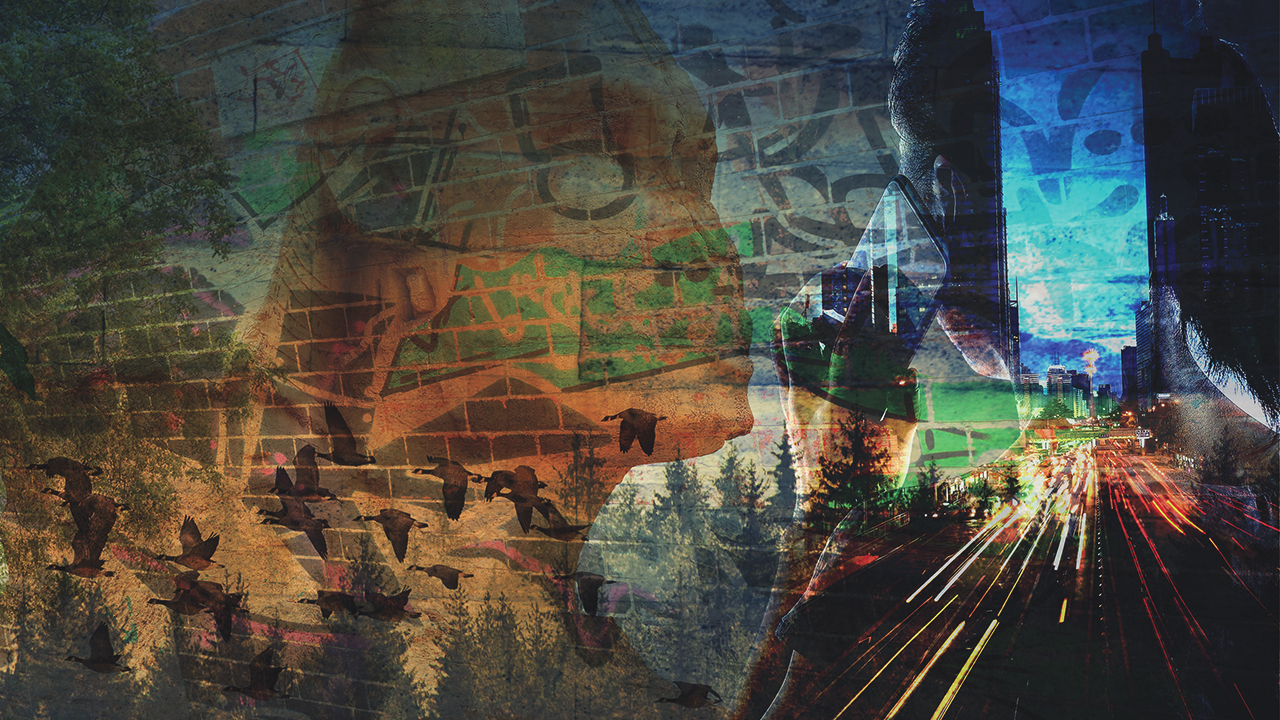
Three things are true: (1) We are the only species that cannot live without technology. (2) All new technology brings about dangerous revenge effects. (3) Humankind cannot live without creating new technology. Items 1 and 2 are pretty obvious. We can’t eat grain without planting and harvesting. We can’t survive the changing weather without making clothing and homes. No other species has to live by its technology. Yet automobiles and airplanes crash, pollute and redefine social structures. Sugarcane harvesting created the slave trade. Robots eliminate jobs. Item 3 is less obvious. But new technologies continually create new needs. People die in automobiles, so we work to invent driver-proof cars. The cycle of invention can never cease, nor will we ever find equilibrium. I tell my fundamentalist friends that I know the Genesis story is true: We really did eat the fruit of the tree of knowledge. Then, like no other species, we must continually live by that fruit. Sure, the story is allegory, but its truth is unassailable. Read more ...
The Psychology Of Materialism, And Why It’s Making You Unhappy
More money, more problems? It might just be true. Americans today, compared to 55 years ago, own twice as many cars and eat out twice as much per person, but we don’t seem to be any happier because of it. Rather than rising levels of well-being, we’ve seen mounting credit card debt and increasing numbers of self-storage facilities to house the things we compulsively buy. The holidays in particular have become a time when consumer culture comes out in full force. Black Friday, the annual post-Thanksgiving discount shopping spree, results each year in multiple deaths and injuries of consumers trampled by crowds in stores and shopping malls. Read more ...
Scientific consensus: Earth's climate is warming
Link recommended by Maria Kelly Walker
Multiple studies published in peer-reviewed scientific journals1 show that 97 percent or more of actively publishing climate scientists agree: Climate-warming trends over the past century are extremely likely due to human activities. In addition, most of the leading scientific organizations worldwide have issued public statements endorsing this position. The following is a partial list of these organizations, along with links to their published statements and a selection of related resources. Read more ...
Support for climate policy linked to people's perceptions about scientific agreement regarding global warming
Link recommended by Maria Kelly Walker
People who believe there is a lot of disagreement among scientists about global warming tend to be less certain that global warming is happening and less supportive of climate policy, researchers at George Mason, San Diego State, and Yale Universities report in a new study published in the journal Nature Climate Change. A recent survey of climate scientists conducted by researchers at the University of Illinois found near unanimous agreement among climate scientists that human-caused global warming is happening. Read more ...
Protection Without a Vaccine
Link recommended by Sahar Anjum
Last month, a team of scientists announced what could prove to be an enormous step forward in the fight against H.I.V. Scientists at Scripps Research Institute said they had developed an artificial antibody that, once in the blood, grabbed hold of the virus and inactivated it. The molecule can eliminate H.I.V. from infected monkeys and protect them from future infections. But this treatment is not a vaccine, not in any ordinary sense. By delivering synthetic genes into the muscles of the monkeys, the scientists are essentially re-engineering the animals to resist disease. Researchers are testing this novel approach not just against H.I.V., but also Ebola, malaria, influenza and hepatitis. Read more ...
In bold new step, Dutch science academy holds women-only elections
Sorry guys—this time it’s women only. That’s the message the Royal Netherlands Academy of Arts and Sciences (KNAW) here has for male researchers during two special elections. In order to reduce its perpetual gender imbalance—87% of its 556 members are men—the academy seeks to recruit 10 new members in 2017 and six more in 2018, all with two X chromosomes. Read more ...
Sexism may be harmful to men's mental health
Men who see themselves as playboys or as having power over women are more likely to have psychological problems than men who conform less to traditionally masculine norms, according to research published by the American Psychological Association. "In general, individuals who conformed strongly to masculine norms tended to have poorer mental health and less favorable attitudes toward seeking psychological help, although the results differed depending on specific types of masculine norms," said lead author Y. Joel Wong, PhD, of Indiana University Bloomington. The study was published in the Journal of Counseling Psychology. Read more ...
Lifesaving Cancer Drugs May in Rare Cases Threaten the Heart
Link recommended by Rahim Jiwani
Powerful drugs that enlist the immune system to fight cancer can, in rare cases, cause heart damage, doctors are reporting. So far, fewer than 1 percent of patients taking these medicines — called checkpoint inhibitors — have developed heart trouble. But in those who do, the damage can be severe, and the drugs have led to several deaths by provoking the immune system to attack the heart. The risk appears highest when patients take two different checkpoint inhibitors at once. Read more ...
The Ethical Significance of Antimicrobial Resistance
Link recommended by Rahim Jiwani
In this paper, we provide a state-of-the-art overview of the ethical challenges that arise in the context of antimicrobial resistance (AMR), which includes an introduction to the contributions to the symposium in this issue. We begin by discussing why AMR is a distinct ethical issue, and should not be viewed purely as a technical or medical problem. In the second section, we expand on some of these arguments and argue that AMR presents us with a broad range of ethical problems that must be addressed as part of a successful policy response to emerging drug resistance. In the third section, we discuss how some of these ethical challenges should be addressed, and we argue that this requires contributions from citizens, ethicists, policy makers, practitioners and industry. We conclude with an overview of steps that should be taken in moving forward and addressing the ethical problems of AMR. Read more ...
This might be why depression is rising among teen girls
There has been a significant climb in the prevalence of major depression among adolescents and young adults in recent years -- and the troubling trend may be strongest in teenage girls, according to a new study. However, the number of adolescents receiving treatment does not appear to follow that same trend, suggests the study, published in the journal Pediatrics on Monday. "Although a recent federal task force recommended screening for depression in young people 12 to 18 years of age, screening is far from universal," said Dr. Mark Olfson, a professor of psychiatry at Columbia University Medical Center and a co-author of the study. "The new study highlights that most adolescents with depression do not receive treatment for their symptoms and underscores the need for increased attention to this condition." Read more ...
Teen hackers study considers link to addiction
A study suggests there are parallels between the way youngsters turn into hackers and how youths become addicted to drugs and alcohol. The report was written for the EU's law enforcement agency Europol. It says that readily available online tools and tutorials make it easy for youth to begin committing cybercrimes. And it warns that a sense of pleasure derived from the acts might encourage some perpetrators to escalate their attacks. "[The hormone] dopamine can be released quickly as vulnerable youth achieve frequent and rapid successes online, and if these successes are linked to anti-social acts, such as hacking, they will be reinforced to pursue further ends to obtain their gains," it states. Read more ...
Are Leadership and Management Essential for Good Research? An Interview Study of Genetic Researchers
Link recommended by Rebecca Mauldin
Principal investigators are responsible for a myriad of leadership and management activities in their work. The practices they use to navigate these responsibilities ultimately influence the quality and integrity of research. However, leadership and management roles in research have received scant empirical examination. Semi-structured interviews with 32 National Institutes of Health (NIH)-funded genetic researchers revealed that they considered leadership and management essential for effective research, but their scientific training inadequately prepared them. We also report management practices that the researchers described using in their labs, as well as their perceptions of a proposed intervention to enhance laboratory leadership. These findings suggest best practices for the research community, future directions for scientific training, and implications for research on leadership and management in science. Read more ...
Science lessons for the next president
George W. Bush won the 2000 presidential election after promising to be a "compassionate conservative" who would cut taxes, promote education, and boost the economy. His presidency, however, soon became dominated by the 2001 terrorist attacks and the wars in Afghanistan and Iraq. But history will note that two science-focused events bracketed the 9/11 attacks. A month earlier, Bush wrestled with whether to allow federal funding for research involving stem cells taken from human embryos. And just a week after the attacks, someone mailed anthrax-filled letters to media outlets and politicians, killing five people and prompting the White House to launch a massive effort to improve bioterror defenses. Read more ...
Liberal Biases, Too, May Block Progress on Climate Change
Are liberals impairing our ability to combat climate change? That may sound like a strange question, particularly to readers of The New York Times. Today conservatives are the ones decidedly blocking any effort by the United States to curb its emissions of greenhouse gases. And yet even as progressive environmentalists wring their hands at the G.O.P.’s climate change denial, there are biases on the left that stray just as far from the scientific consensus. “The left is turning anti-science,” Marc Andreessen, the creator of Netscape who as a venture capitalist has become one of the most prominent thinkers of Silicon Valley, told me not long ago. Read more ...
Environmental risk factors for dementia: a systematic review
Dementia risk reduction is a major and growing public health priority. While certain modifiable risk factors for dementia have been identified, there remains a substantial proportion of unexplained risk. There is evidence that environmental risk factors may explain some of this risk. Thus, we present the first comprehensive systematic review of environmental risk factors for dementia. Read more ...
Harvard and MIT professors win Nobel prize in economics
Two professors from Harvard and MIT have been awarded the Nobel Prize in economics for contributions to contract theory -- the agreements that shape business, finance and public policy. Oliver Hart, 68, a British economist teaching at Harvard, and Bengt Holmström, 67, a Finnish economist teaching at MIT, were announced as the winners Monday by the Royal Academy of Sciences in Stockholm, Sweden. "Contracts are essential to the functioning of modern societies," the academy said in its announcement. "Hart's and Holmström's research sheds light on how contracts help us deal with conflicting interests."
1. Article in CNN
2. Article in INDEPENDENT
3. Article in New York Times
Clinton calls for intel surge as predictive technology gathers steam
As authorities scramble to find ways to prevent the next mass terror plot, a new technology could change those investigations: high-speed analytics aimed at helping law enforcement find terrorist plotters -- and stop them before they attack. It is the kind of cyber resource that Hillary Clinton has seized on for her proposed "intelligence surge" to defeat ISIS and other terrorist threats as they recruit adherents and plan attacks using online tools. Meeting with national security experts in September, Clinton said an area of deep focus was "what it would take to surge our intelligence, to help us detect and prevent attacks before they happen." Read more ...
Fuel 'too dirty' for Europe sold to Africa
Swiss firms have been criticised in a report for their links to the African trade in diesel with toxin levels that are illegal in Europe. Campaign group Public Eye says retailers are exploiting weak regulatory standards. Vitol, Trafigura, Addax & Oryx and Lynx Energy have been named because they are shareholders of the fuel retailers. Trafigura and Vitol say the report is misconceived and retailers work within legal limits enforced in the countries. Read more ...
Albert Einstein's special mark on the universe
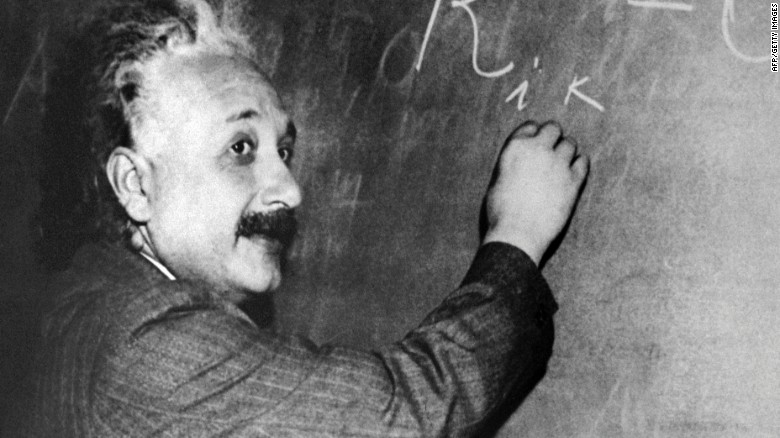
It has been exactly 100 years since Albert Einstein presented his theory of general relativity to an audience of scientists on November 25, 1915. While virtually everyone has heard of Einstein and his theory, very few people have any idea of what the theory actually is.
This is a shame, not only because there is a great public thirst for understanding of it, but also because relativity is important, for at least four major reasons.
General relativity provides our modern understanding of space, time and gravity -- which means it's crucial to almost everything we do in physics and astronomy. For example, you cannot understand black holes, the expansion of the universe or the Big Bang without first understanding the basic ideas of relativity. Though few people realize it, Einstein's famous equation E = mc2 is actually part of the theory of relativity, which means that relativity also explains how the sun shines and how nuclear power works.
A second reason everyone should know about relativity lies in the way it changes our perception of reality. Relativity tells us that our ordinary perceptions of time and space are not universally valid. Instead, space and time are intertwined as four-dimensional space-time. Read more...
The Neoliberal Arts
How college sold its soul to the market
Irecently spent a semester teaching writing at an elite liberal-arts college. At strategic points around the campus, in shades of yellow and green, banners displayed the following pair of texts. The first was attributed to the college’s founder, which dates it to the 1920s. The second was extracted from the latest version of the institution’s mission statement:
Numerous studies have demonstrated the benefits of contact with nature for human well-being. However, despite strong trends toward greater urbanization and declining green space, little is known about the social consequences of such contact. In the December issue of BioScience, an international, interdisciplinary team reports on how they used nationally representative data from the United Kingdom and stringent model testing to examine the relationships between objective measures and self-reported assessments of contact with nature, community cohesion, and local crime incidence.
The paramount obligation of a college is to develop in its students the ability to think clearly and independently, and the ability to live confidently, courageously, and hopefully.
leadership
service
integrity
creativity
Read more...
Without Albert Einstein, We’d All Be Lost

Do you like your GPS? Thank his general theory of relativity, an astonishing feat of the human mind.
One hundred years ago this week, on Nov. 4, 1915, Albert Einstein, working alone in wartime Berlin, submitted the first of four scientific papers that would change the course of physics and our view of the cosmos. His general theory of relativity is perhaps the greatest achievement of a single human mind. Although it made Einstein the most famous scientist in history, he did not live to see the full impact of his ideas.
Only now, a century later, are we gathering apples from the tree he planted: black holes that tear stars apart and produce the most violent explosions in the universe; cosmic gravitational lenses that distort images of faraway galaxies, as if seen through a funhouse mirror. And perhaps the biggest wonder of all: a comprehensive and detailed understanding of the evolution of the universe. Amazingly, in just 100 years, humankind has uncovered 13.8 billion years of cosmic history. Read more...
Contact with nature

Human exposure to nature is linked to safer communities with better social, community interactions
In a first-of-its-kind study, an international team tested social correlates of both objective and subjective contact with nature in a systematic way, revealing complex linkages between nature, social cohesion, and a variety of other factors.
Numerous studies have demonstrated the benefits of contact with nature for human well-being. However, despite strong trends toward greater urbanization and declining green space, little is known about the social consequences of such contact. In the December issue of BioScience, an international, interdisciplinary team reports on how they used nationally representative data from the United Kingdom and stringent model testing to examine the relationships between objective measures and self-reported assessments of contact with nature, community cohesion, and local crime incidence.
1. Contact with nature may mean more social cohesion, less crime
2. More Contact with Nature May Reduce Crime
COP:21 Why Science Will Make All the Difference
Link recommended by Mythri Pullela

I’m a climate scientist headed to Paris next week for the 21st round of U.N. Conference of Parties climate talks because I believe this time will be different. Why? Science.
In less than one week, COP21 will establish an international agreement on the reduction of carbon dioxide, methane, and other greenhouse gas emissions required to keep global warming below 2 degrees Celsius. But individually and collectively the commitments countries have made in advance of COP21, even if carried out to the letter, have failed to meet this target, allowing warming to 2.7–3 degrees. I’m making the trip to observe the talks and join in with organizations demanding better commitments than that. Read more ...
Unethical scientific experiments: going to extremes
Link recommended by Jeeva Babu

Separating Twins
The experiment: Splitting up twins after birth – and then controlling every aspect of their environment.
The premise: In the quest to tease out the interplay of nature and nurture, researchers have one obvious resource: identical twins, whose genes are nearly 100 per cent the same. Twins almost always grow up together in essentially the same environment. A few studies have been able to track those separated at a young age, usually by adoption, but it’s impossible to control or analyse all the ways that their lives differ. If scientists could control the siblings’ environment from the start, they could construct a rigorously designed study. It would be one of the least ethical imaginable, but it might be the only way (short of cloning humans for research) that we’d ever solve some big questions about genetics and upbringing. Read more ...
This Story Stinks
Links recommended by Brian Rohde

In the beginning, the technology gods created the Internet and saw that it was good. Here, at last, was a public sphere with unlimited potential for reasoned debate and the thoughtful exchange of ideas, an enlightening conversational bridge across the many geographic, social, cultural, ideological and economic boundaries that ordinarily separate us in life, a way to pay bills without a stamp.
Then someone invented “reader comments” and paradise was lost.
1. This Story Stinks
2. Comment isn’t free: the downside of Web 2.0
3. The “Nasty Effect:” Online Incivility and Risk Perceptions of Emerging Technologies
Controversial research: Good science bad science
Link recommended by Suraj Upadhyaya
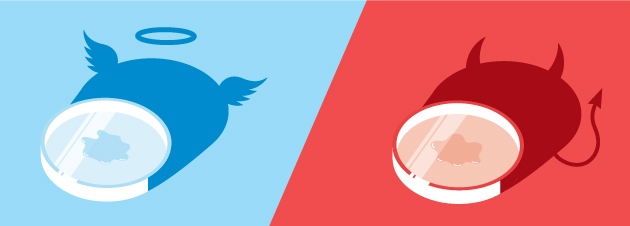
It sounds like a great idea: experimentally mutate a rare but deadly virus so that scientists can do a better job of recognizing dangerous emerging strains. But it also sounds like a terrible idea — the studies could create a virus that is easier to transmit and produce findings that are useful to bioterrorists.
Last year's news that two research teams had done exactly that with the H5N1 bird flu virus was enough to spread fear around the globe and prompt a temporary moratorium on the work. A US biosecurity panel has since lifted its restrictions on publication of the teams' findings in Nature and Science, arguing that the work has clear potential benefits, that the modified virus seems to be less lethal than the original and that the data are already circulating in the community. But the episode has highlighted how thin the line can be between research that's a blessing and research that's a threat. Read more...
A right to know - biological origins of IVF children to be stated on birth certificates
Link recommended by Suraj Upadhyaya

Children born from donated sperm or eggs will have the information marked on their birth certificates under sweeping changes to fertility laws proposed by an influential group of ministers and peers yesterday.
The move, designed to bolster childrens' right to know their origins, is among a raft of far-reaching recommendations the government will consider ahead of its planned reforms of legislation which has been overtaken by science.
The proposals amount to a parliamentary demand for the government to tear up its draft fertility bill, published in May, in favour of a more permissive approach that would see substantial changes in ethically contentious areas, such as the creation of "saviour siblings", the use of surplus embryos in research and the need for children conceived through IVF treatment to have a legal father figure. Read more...
Does the digital era herald the end of history?
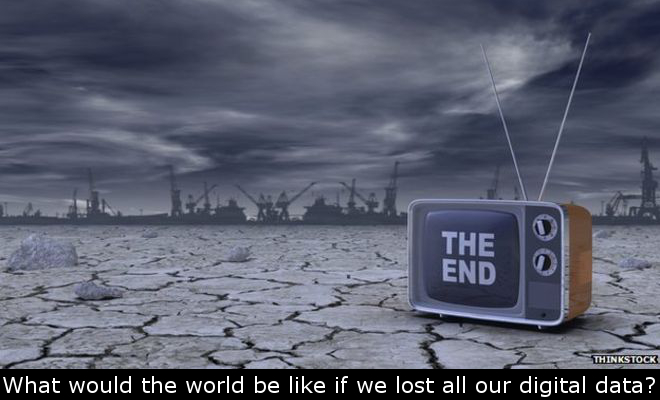
What would the world be like if we lost all our digital data?
Has the digital transformation of our society put the future of recorded history in jeopardy? Many internet observers fear so. But why, and what do they mean?
Since the 1980s our lives have grown increasingly digital, and with dizzying speed.
Most of our photos, videos, conversations, research and writings are now stored as strings of ones and noughts on local computers or in data centres distributed throughout the world.
Mr Horvitz has said about a quarter of his team's resources are focused on AI.
Data specialist EMC estimates that in 2013 the world contained about 4.4 zettabytes (4.4 trillion gigabytes) of data. By 2020, it expects this to have risen tenfold. Read more...
The End of California?
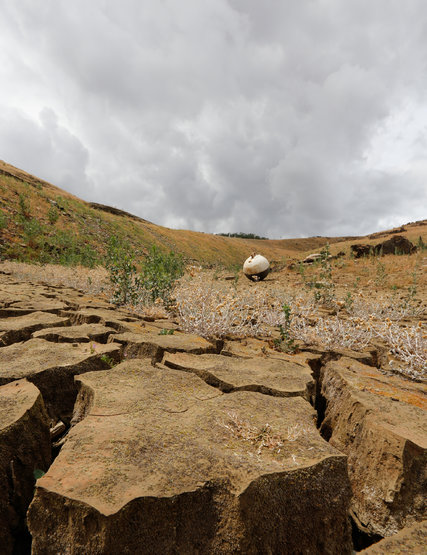
In a normal year, no one in California looks twice at a neighbor’s lawn, that mane of bluegrass thriving in a sun-blasted desert. Or casts a scornful gaze at a fresh-planted almond grove, saplings that now stand accused of future water crimes. Or wonders why your car is conspicuously clean, or whether a fish deserves to live when a cherry tree will die.
Of course, there is nothing normal about the fourth year of the great drought: According to climate scientists, it may be the worst arid spell in 1,200 years. For all the fields that will go fallow, all the forests that will catch fire, all the wells that will come up dry, the lasting impact of this drought for the ages will be remembered, in the most exported term of California start-ups, as a disrupter. Read more...
Microsoft's Bill Gates insists AI is a threat

Humans should be worried about the threat posed by artificial Intelligence, Bill Gates has said.
The Microsoft founder said he didn't understand people who were not troubled by the possibility that AI could grow too strong for people to control.
Mr Gates contradicted one of Microsoft Research's chiefs, Eric Horvitz, who has said he "fundamentally" did not see AI as a threat.
Mr Horvitz has said about a quarter of his team's resources are focused on AI.
During an "ask me anything" question and answer session on Reddit, Mr Gates wrote: "I am in the camp that is concerned about super intelligence. First the machines will do a lot of jobs for us and not be super intelligent. That should be positive if we manage it well. Read more...
Myrna Perez Sheldon: We’re Celebrating Our Anniversary by Discussing Cosmos

Our magazine is a year old this week. And in that year, we have not mentioned the series Cosmos. Not even once. This is odd for several reasons, not the least of which is that we share the beginning of our name with the program. It also, however, happens to be one of most familiar cultural touchstones for science and religion from the past few decades.
Cosmos, for those of you who don’t know, was a PBS series that first aired in 1980. Written by Carl Sagan and his wife Ann Druyan, the series launched Sagan into a stratosphere of scientific celebrity unmatched during his day. The thirteen-part series, subtitled “A Personal Voyage,” followed Sagan as he embarked on a quest to understand the mysteries of the universe.Cosmos was rebooted last year, this time with astrophysicist Neil deGrasse Tyson as the host. The new series largely follows the format of the original, while updating both the science and the computer graphics of the 1980s version. Read more...
The big dangers of 'big data'
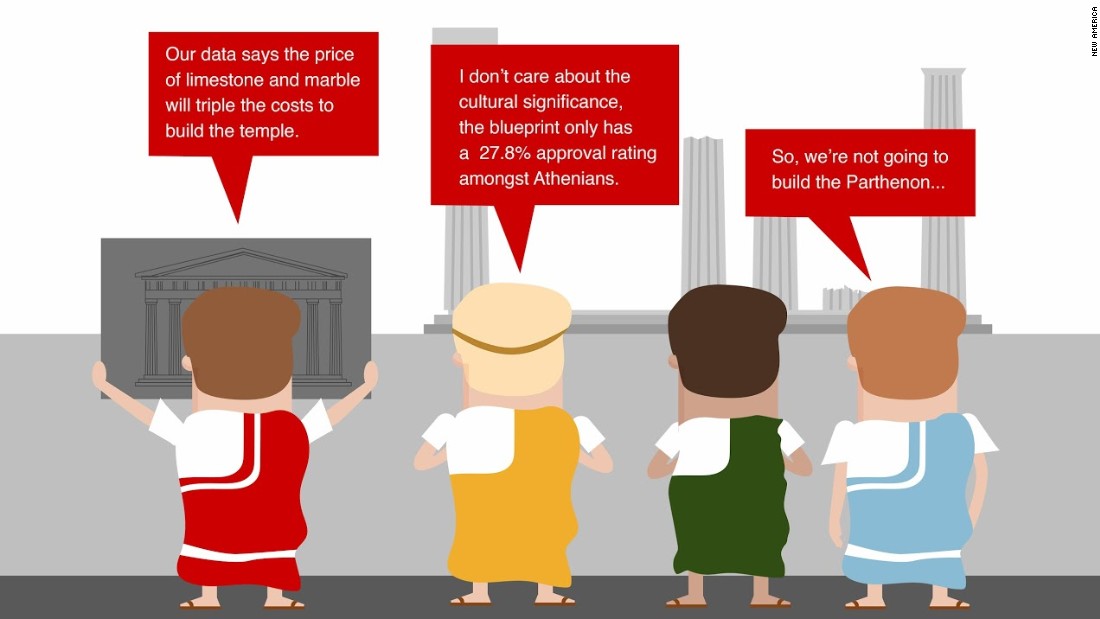
One way to tell the story of human progress is to gawk at our increasing capacity to measure. Precise statements such as "the economy shrank by 2.7%" replace generalities like "times are tough."
"Big data" and "evidence-based policy" are the dominant ideas of our moment. A May 2014 White House report put it this way: "Big data will become an historic driver of progress, helping our nation perpetuate the civic and economic dynamism that has long been its hallmark."
The White House report presents big data as an analytically powerful set of techniques. It says the social and economic value created by big data should be balanced against "privacy and other core values of fairness, equity and autonomy." Read more...
Bulletin of the Atomic Scientists moves Doomsday Clock 2 minutes closer to midnight
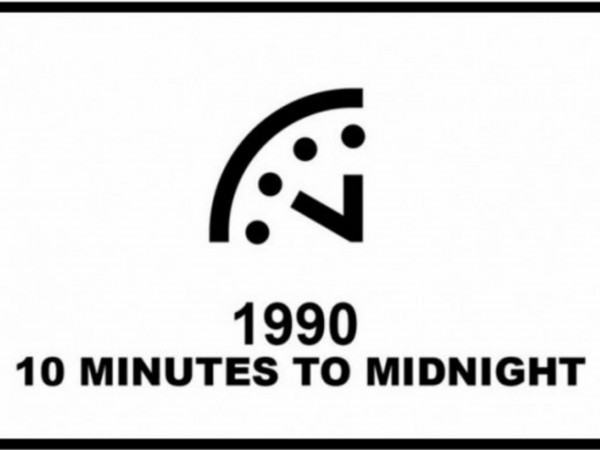
The board that runs the Bulletin of the Atomic Scientists (BAS) has decided to move the minute hand on its symbolic Doomsday Clock 2 minutes closer to disaster. The clock now shows 3 minutes before midnight because the “probability of global catastrophe is very high” as a result of continuing climate change and efforts to modernize nuclear weapons stockpiles.
“In 2015, unchecked climate change, global nuclear weapons modernizations, and outsized nuclear weapons arsenals pose extraordinary and undeniable threats to the continued existence of humanity,” the group said in a statement. “[W]orld leaders have failed to act with the speed or on the scale required to protect citizens from potential catastrophe. These failures of political leadership endanger every person on Earth.” Read more...
Was first nuclear test the start of new human-dominated epoch, the Anthropocene?

An international group of scientists has recommended that the fateful Trinity nuclear test on July 16, 1945, be considered the dawn of a new geological age dubbed the Anthropocene – an era in which humans increasingly shape the planet.
Scientists divide Earth history into epochs, periods and other time units bounded by geological or biological signals, such as those left in the rock record by the mass extinctions that ended the Cretaceous and Permian eras, and the end of the last ice age that kicked off the current Holocene epoch. Read more...
The danger of 'emotional' machines
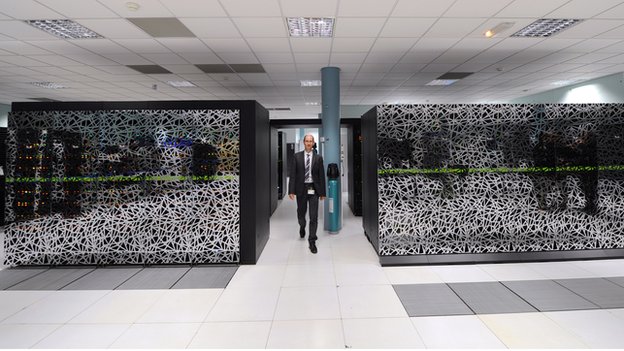
Last week a computer program reportedly passed the Turing test by successfully convincing humans it communicated with that it was a real person at least 30% of the time.
Although the results have been challenged by some scientists, it seems to be only a matter of time before computer artificial intelligence is sufficiently capable of pulling of the ruse.
The prospect has Die Welt's Torsten Krauel worried. Read more...
Bhopal disaster: 30 years on, Indian advocates still seeking justice for gas leak victims

In 1984 a cyanide gas leak from a pesticide factory, owned by Union Carbide, killed thousands of residents in the Indian city of Bhopal.
Activist Satinath Sarangi arrived in Bhopal the day after the leak and witnessed people struggling to breathe, some choking, babies crying, and a community in shock.
"The two things I remember most from the immediate aftermath of the disaster was just the magnitude of it; the number of people we saw who were in terrible pain, and the helplessness," he told the ABC. Read more...
Most people would rather harm themselves than others for profit
Link recommended by Meagan Chladny

A UCL-led experiment on 80 pairs of adults found that people were willing to sacrifice on average twice as much money to spare a stranger pain than to spare themselves, despite the decision being secret.
The study, conducted by researchers from UCL (University College London) and Oxford University and funded by the Wellcome Trust, was the first to experimentally compare how much pain people were willing to anonymously inflict on themselves or strangers in exchange for money. The research is published in Proceedings of the National Academy of Sciences. Read more...
Dr. Brad Spellberg: Antibiotic Resistance Is “Everyone’s Fault”
Link recommended by Sophia Ewens
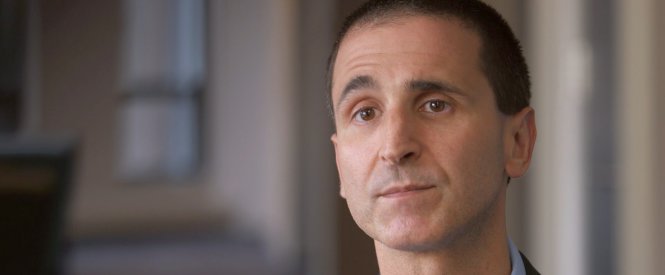
Can you give me a very brief explanation of the discovery of antibiotics and what the significance of that was for public health and for modern medicine?
In the pre-antibiotic era, doctors were taught in medical school that they should admit to themselves they could not change the course of their patients’ illnesses. They had no interventions that could really change things. Their job was to make an accurate diagnosis so they could give an accurate prognosis to the patient. Read more...
Transcripts Kept Secret for 60 Years Bolster Defense of Oppenheimer’s Loyalty
By William J. BroadLink recommended by Zoe Lipowski

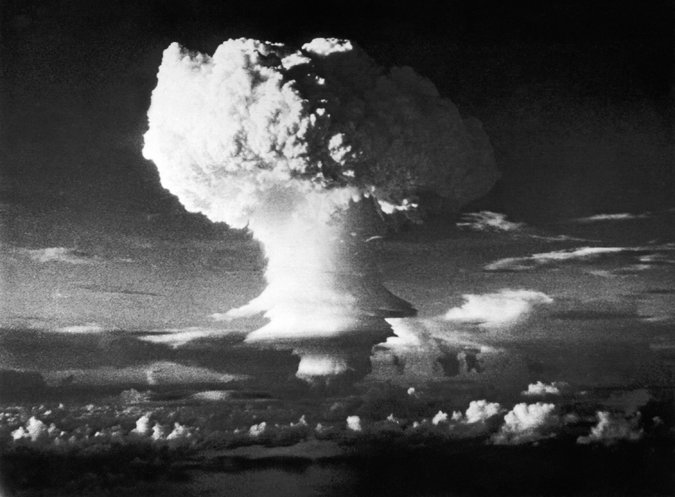
At the height of the McCarthy era, J. Robert Oppenheimer, the government’s top atomic physicist, came under suspicion as a Soviet spy.
After 19 days of secret hearings in April and May of 1954, the Atomic Energy Commission revoked his security clearance. The action brought his career to a humiliating close, and Oppenheimer, until then a hero of American science, lived out his life a broken man. Read more ...
When Scientists Give Up
By Richard HarrisLink recommended by Chris King Waters


Ian Glomski thought he was going to make a difference in the fight to protect people from deadly anthrax germs. He had done everything right — attended one top university, landed an assistant professorship at another.
But Glomski ran head-on into an unpleasant reality: These days, the scramble for money to conduct research has become stultifying.
So, he's giving up on science. Read more ...
Jane Goodall Opens Up About Where Science Has Gone Wrong
By Jacqueline HowardLink recommended by Chris King Waters

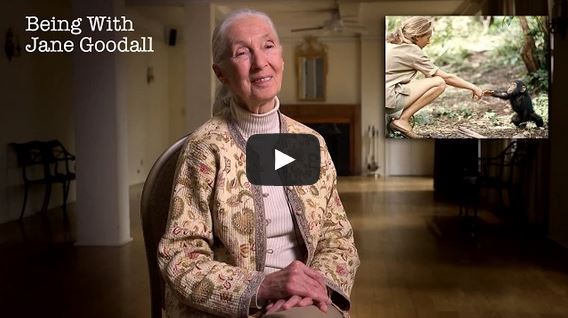
If Jane Goodall could change one thing about the way science is done, this is probably it.
In a new video from NOVA's web series "The Secret Life of Scientists and Engineers", the celebrated primatologist recalls how, early in her career (see above), other researchers criticized her for referring to her animal subjects as "he" or "she," as well as for giving names to the chimpanzees she studied.
"I was told you have to give them numbers because you have to be objective as a scientist," Goodall says in the video, "and you mustn't empathize with your subject. And I feel this is where science has gone wrong. To have this coldness, this lack of empathy, has enabled some scientists to do unethical behavior." Read more ...
Naughty or Nice? When Does It Begin?
Link recommended by Chris King Waters

On the platform of a subway station, a woman and two men are talking a few feet away from the open track pit. Without warning, one of the men shoves the woman. She staggers backward toward the edge. The other man reaches out to catch her, but he is too late, and down she goes onto the tracks. In an instant, he reacts. He turns on his heels and coldcocks the culprit. It is a magnificent roundhouse to the face that snaps the wrongdoer's head back. Satisfied with this act of revenge, he turns, hesitates and dashes over to pull the woman to safety. He reassures her, then takes off after the malefactor, who has beat a hasty retreat. The entire incident takes 20 seconds. Read more ...
U.N. report: Our oceans are trashed with plastic
By Casey Tolan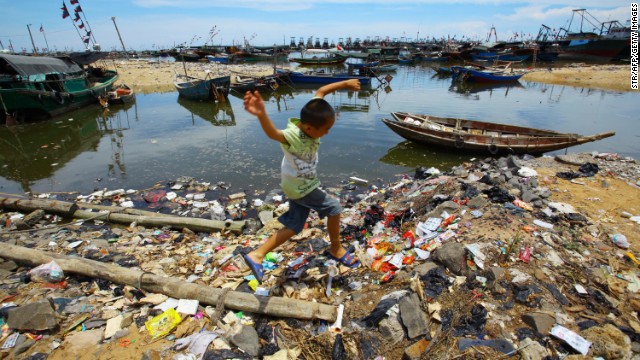
A series of new reports are raising concerns about the damage plastic waste is doing to oceans -- harming marine animals, destroying sensitive ecosystems, and contaminating the fish we eat.
But experts say that the solution to the problem isn't in the ocean it's on land. Read more ...
Research Ethics Timeline (1932-Present)
by David B. Resnik, J.D., Ph.D.• 1932-1972
The Tuskegee Syphilis Study, sponsored by the U.S. Department of Health. Studied the effects of untreated syphilis in 400 African American men. Researchers withheld treatment even when penicillin became widely available. Researchers did not tell the subjects that they were in an experiment. Most subjects who attended the Tuskegee clinic thought they were getting treatment for "bad blood."
• 1939-45
German scientists conduct research on concentration camp prisoners.
• 1940 O.R.
Two Nazi refugee scientists, Frisch and R.E. Peierls, warn the U.S. about Germany's nuclear weapons program. Albert Einstein writes a letter to Pres. Truman warning him about the Nazi threat. Read more ...
$1.1 billion is merely the headline in momentous California lead paint case
By Michael Yudell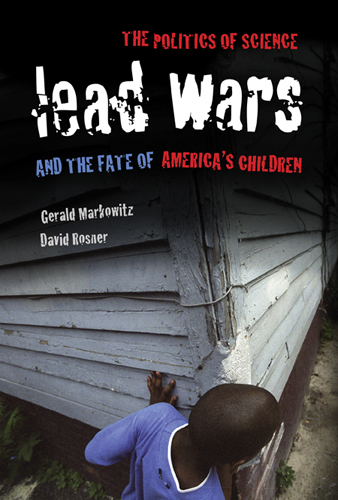
On Monday, a California judge ordered three corporations —Sherwin-Williams, NL Industries, and ConAgra—to contribute $1.1 billion into a state-run fund to clean up lead paint hazards in 10 California cities and counties.
The ruling, in a case that was originally filed in 2000, calls attention to lead paint as an ongoing and urgent public health risk. As Santa Clara Superior Court Judge James P. Kleinberg wrote in his decision, “white lead carbonate and the paint in which it is a key ingredient are harmful particularly to children,” “there is no safe level of lead in the blood,” “lead paint causes significant physical harm to individuals which has lasting effects,” and “there is a clear and present danger that needs to be addressed.” Read more ...
Post-Chernobyl 137Cs in the atmosphere of Thessaloniki: a consequence of the financial crisis in Greece
by S. Stoulos, A. Ioannidou, E. Vagena, P. Koseoglou, M. ManolopoulouThe background radiation level of 137Cs at the urban atmosphere of Thessaloniki has been increased during the recent decade only due to the Fukushima accident fallout. Since then, no other signal of 137Cs was observed until the winter period of 2013, when slightly elevated 137Cs concentrations were measured. The 137Cs signals observed were up to 12 μBq m−3, mainly during holidays and weekends followed by lower or even non-detectable activities in the next working days. Those episodes are attributed to the increase of biomass products combustion for residential heating as this year the tax of oil for heating was drastically raised as a consequence of the financial crisis. A preliminary survey of various wood products as well as of bottom ashes from different domestic burning devices is presented. 137Cs concentrations up to 11 Bq kg−1 were measured in wood products and up to 500 Bq kg−1 in ash samples. Read more ...

Should cloned mammoths roam the Earth?
Link recommended by Sonia Jiwani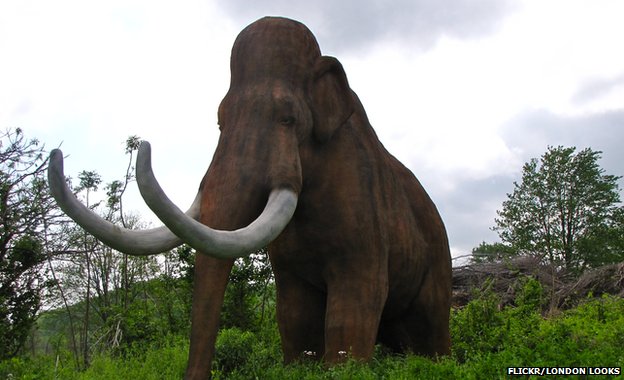 Cloning an extinct species might be possible, but should we go down that route? Julian Savulescu, professor of practical ethics at the University of Oxford, and Russell Powell, assistant professor of philosophy at Boston University, discuss the potential ethical issues of bringing back an extinct animal.
Cloning an extinct species might be possible, but should we go down that route? Julian Savulescu, professor of practical ethics at the University of Oxford, and Russell Powell, assistant professor of philosophy at Boston University, discuss the potential ethical issues of bringing back an extinct animal.
Theoretically, mammoths could be cloned by recovering, reconstructing or synthesizing viable mammoth DNA and injecting it into the egg cell of a modern elephant whose nuclear DNA has been removed; alternatively, mammoth genetic material could be introduced into an elephant genome in order to create a mammoth-elephant hybrid or chimera. Read more ...

VIDEO: Time-lapse map shows all of the nuclear bombs exploded over 50 years
By Lee MorganLink recommended by Lauren Galley
 Isao Hashimoto shows where nuclear activity was occurring in the year 1982.
Isao Hashimoto shows where nuclear activity was occurring in the year 1982.
This mesmerizing time-lapse map shows every single nuclear bomb that has exploded worldwide since 1945.
Japanese artist Isao Hashimoto mapped each detonation that rocked the Earth until 1998, before turning it into a hypnotizing 14-minute video clip. Read more ...

Ethical reproducibility: towards transparent reporting in biomedical research
James A Anderson, Marleen Eijkholt & Judy IllesLink recommended by Lauren Galley
Optimism about biomedicine is challenged by the increasingly complex ethical, legal and social issues it raises. Reporting of scientific methods is no longer sufficient to address the complex relationship between science and society. To promote ‘ethical reproducibility’, we call for transparent reporting of research ethics methods used in biomedical research. Read more ...

The role of ethics in science and engineering
By Deborah G. JohnsonLink recommended by Lauren Galley
It is generally thought that science and engineering should never cross certain ethical lines. The idea connects ethics to science and engineering, but it frames the relationship in a misleading way. Moral notions and practices inevitably influence and are influenced by science and engineering. The important question is how such interactions should take place. Anticipatory ethics is a new approach that integrates ethics into technological development. Read more ...

In cancer drug battle, both sides appeal to ethics
By William Hudson, CNNLink recommended by Rahul Goel
 Andrea Sloan's situation raises the question: When should patients get access to experimental drugs?
Andrea Sloan's situation raises the question: When should patients get access to experimental drugs?
Andrea Sloan is dying of ovarian cancer. Having exhausted all standard treatment options, her doctors say her best hope now is a new class of cancer drugs called PARP inhibitors.
The California pharmaceutical company BioMarin makes one version of these drugs called BMN 673. Earlier this year, the company presented very early data on this experimental drug at a large cancer conference. Initial results in women with breast and ovarian cancer were encouraging. Read more ...

Paul Root Wolpe: It's time to question bio-engineering
FILMED NOV 2010 • POSTED MAR 2011 • TEDxPeachtreeLink recommended by Shyam Panthi
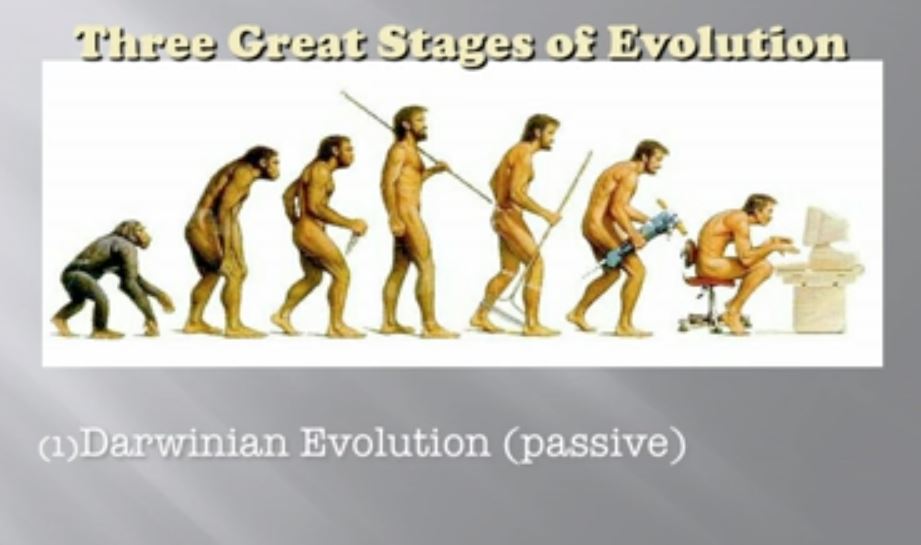
Bioethicist Paul Root Wolpe describes an astonishing series of recent bio-engineering experiments, from glowing dogs to mice that grow human ears. He asks: Isn't it time to set some ground rules?
Paul Root Wolpe examines the ethical implications of new science -- genetic modification, neuroscience and other breakthroughs that stretch our current philosophy to the breaking point. He's the chief bioethicist at NASA, among other appointments. Read more ...

The Hippocratic Oath Today
By Peter TysonLink recommended by Stephanie Cox

The Hippocratic Oath is one of the oldest binding documents in history. Here you’ll find classical and modern versions of the oath as well as a brief article that offers a sense of the controversial nature of the oath today. Follow links at the bottom of the page to post your own comment or read those of others.
THE OATH: MEANINGLESS RELIC OR INVALUABLE MORAL GUIDE? The Hippocratic Oath is one of the oldest binding documents in history. Written in antiquity, its principles are held sacred by doctors to this day: treat the sick to the best of one's ability, preserve patient privacy, teach the secrets of medicine to the next generation, and so on. "The Oath of Hippocrates," holds the American Medical Association's Code of Medical Ethics (1996 edition), "has remained in Western civilization as an expression of ideal conduct for the physician." Today, most graduating medical-school students swear to some form of the oath, usually a modernized version. Indeed, oath-taking in recent decades has risen to near uniformity, with just 24 percent of U.S. medical schools administering the oath in 1928 to nearly 100 percent today. Read more ...

What is Ethics in Research & Why is it Important?
by David B. Resnik, J.D., Ph.D.Link recommended by Stephanie Cox
When most people think of ethics (or morals), they think of rules for distinguishing between right and wrong, such as the Golden Rule ("Do unto others as you would have them do unto you"), a code of professional conduct like the Hippocratic Oath ("First of all, do no harm"), a religious creed like the Ten Commandments ("Thou Shalt not kill..."), or a wise aphorisms like the sayings of Confucius. This is the most common way of defining "ethics": norms for conduct that distinguish between acceptable and unacceptable behavior. Read more ...
Nuclear energy film overstates positives, underplays negatives
By Ralph Cavanagh and Tom Cochran, Special to CNN
After the disaster at Japan's Fukushima nuclear plant, anti-nuclear groups take issue with a new film about nuclear energy.
(CNN) -- The new film "Pandora's Promise" is a love song to nuclear power that claims to be a documentary, but like all good propaganda it omits key parts of the story, overstates the positives and underplays the negatives.
Built around the (false) proposition that improved quality of life requires commensurate growth in energy use (a recurring visual theme is a globe that glows brighter and brighter), the movie presents nuclear power as the only plausible solution to global warming. Read more ...

Militaries' growing use of ground robots raises ethics concerns
By Andrew ConteLink recommended by Ruth Tenorio
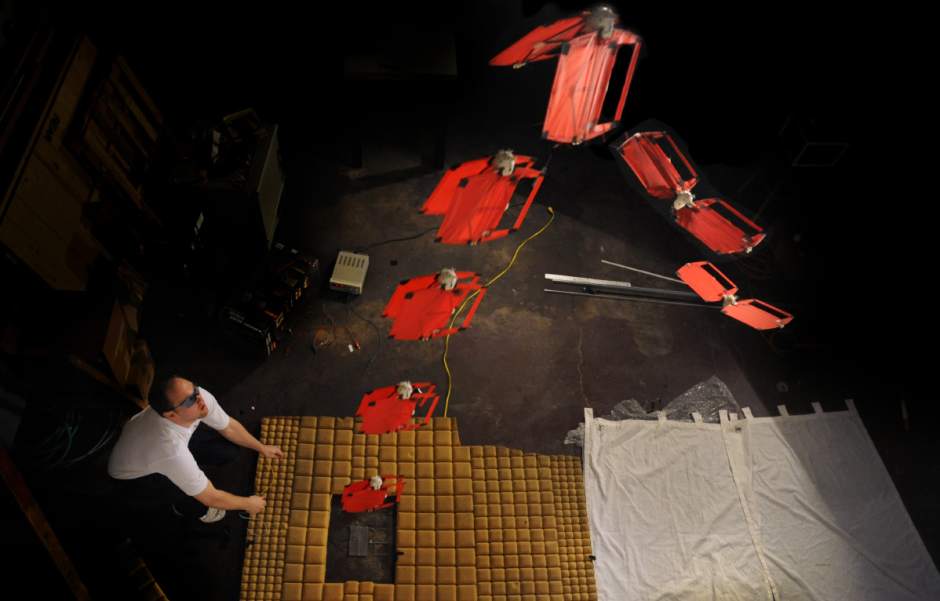
Published: Saturday, May 18, 2013, 11:00 p.m
If North Korea's dictator Kim Jong Un ever orders troops into the demilitarized zone, an army of South Korean robots could be waiting.
A Samsung subsidiary plans to deploy sentry robots to the tense South Korean border. The machines will be equipped with machine guns and cameras, thermal imaging and laser range finders capable of detecting intruders up to 2 1⁄2 miles away. Read more ...

Illinois Biggest Atomic Dump as U.S. Fails to Pick Site
By Brian Wingfield - Oct 24, 2013 11:00 PM CTLink recommended by Nathan Parker
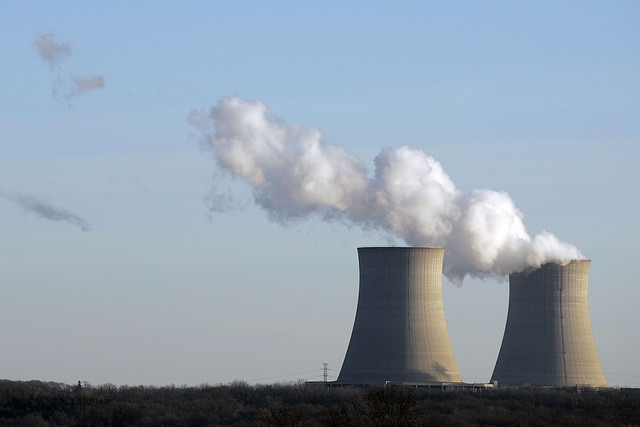
Probing the biological basis of certain traits ignites controversy. But some scientists choose to cross the red line anyway.
U.S. lawmakers have debated for decades where to put all the spent fuel generated by the nation’s nuclear power plants. The dithering means that an unintended site has emerged: Illinois.
Across the country, atomic power plants “have become de facto major radioactive waste-management operations,” Robert Alvarez, a former adviser to Energy Department secretaries during President Bill Clinton’s administration, said in a phone interview. Read more ...

Ethics: Taboo genetics
02 October 2013Link recommended by Zahra Pisheh
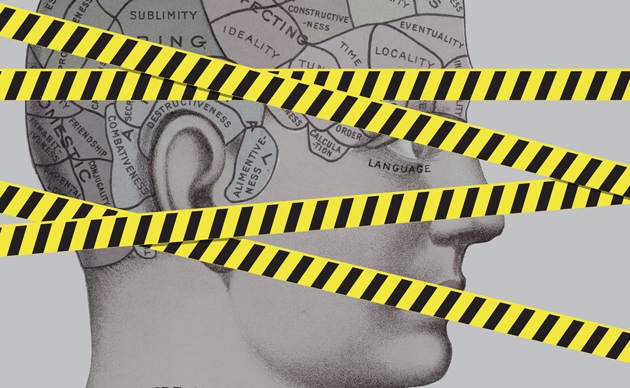
Probing the biological basis of certain traits ignites controversy. But some scientists choose to cross the red line anyway.
Growing up in the college town of Ames, Iowa, during the 1970s, Stephen Hsu was surrounded by the precocious sons and daughters of professors. Around 2010, after years of work as a theoretical physicist at the University of Oregon in Eugene, Hsu thought that DNA-sequencing technology might finally have advanced enough to help to explain what made those kids so smart. He was hardly the first to consider the genetics of intelligence, but with the help of the Chinese sequencing powerhouse BGI in Shenzhen, he planned one of the largest studies of its kind, aiming to sequence DNA from 2,000 people, most of whom had IQs of more than 150.Read more ...

“I prefer a child with …”: designer babies, another controversial patent in the arena of direct-to-consumer genomics
Genetics in Medicine (2013) doi:10.1038/gim.2013.164Link recommended by Zahra Pisheh
In December 2009, claiming priority from an earlier US patent application filed in December 2008, the Californian direct-to-consumer genetic testing company 23andMe filed US Patent Application Serial No. 12/592950. A Notice of Allowance for this case was issued by the US Patent and Trademark Office in June 2013, and it will issue as US Patent No. 8543339 on 24 September 2013. It contains claims to a computer system and to a computer program, but our focus here is on the patent’s claims to a method for gamete donor selection: Read more ...
How science goes wrong
Oct 19th 2013 |From the print edition of The Economist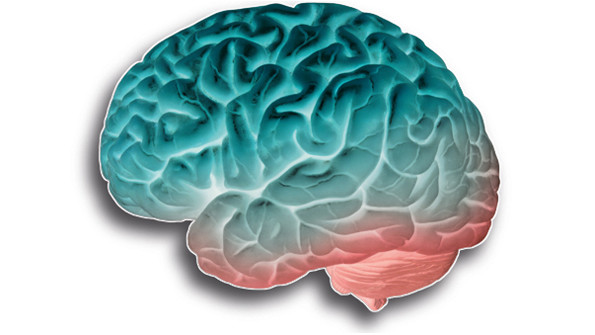
Scientific research has changed the world. Now it needs to change itself.
A SIMPLE idea underpins science: “trust, but verify”. Results should always be subject to challenge from experiment. That simple but powerful idea has generated a vast body of knowledge. Since its birth in the 17th century, modern science has changed the world beyond recognition, and overwhelmingly for the better.
But success can breed complacency. Modern scientists are doing too much trusting and not enough verifying—to the detriment of the whole of science, and of humanity. Read more ...
China recycling cleanup jolts global industry
Joe Mcdonald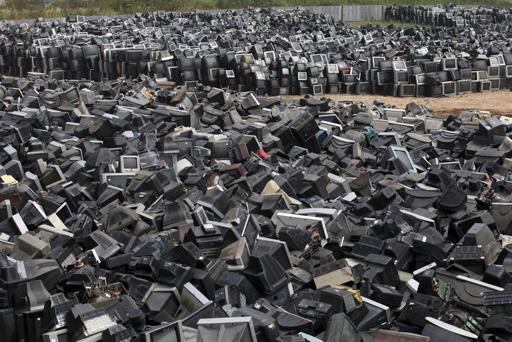
In this photo taken Aug. 26, 2013, discarded television sets pile up in a scrap yard awaiting recycling in Zhuzhou city in south China's Hunan province.
BEIJING (AP) -- China for years has welcomed the world's trash, creating a roaring business in recycling and livelihoods for tens of thousands. Now authorities are clamping down on an industry that has helped the rich West dispose of its waste but also added to the degradation of China's environment. Read more ...

US brain project puts focus on ethics
Helen ShenLink recommended by Dennis Boriski
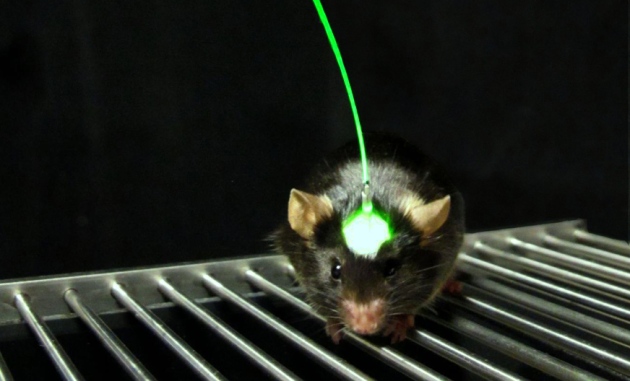 Unsettling research advances bring neuroethics to the fore.
Unsettling research advances bring neuroethics to the fore.
The false mouse memories made the ethicists uneasy. By stimulating certain neurons in the hippocampus, Susumu Tonegawa and his colleagues caused mice to recall receiving foot shocks in a setting in which none had occurred. Tonegawa, a neuroscientist at the Massachusetts Institute of Technology in Cambridge, says that he has no plans to ever implant false memories into humans — the study, published last month, was designed just to offer insight into memory formation. Read more ...
Report raises ethical concerns about human enhancement technologies
Alok Jha, science correspondent Would it be acceptable for an employer to require staff to take a cognitive-enhancing drug that improved their performance at work? Photograph: Guardian
Would it be acceptable for an employer to require staff to take a cognitive-enhancing drug that improved their performance at work? Photograph: Guardian
Scientists and ethicists call for public debate about the future use of drugs or other enhancements in the workplace. Read more ...
How to Power the World without Fossil Fuels
By Mark Fischetti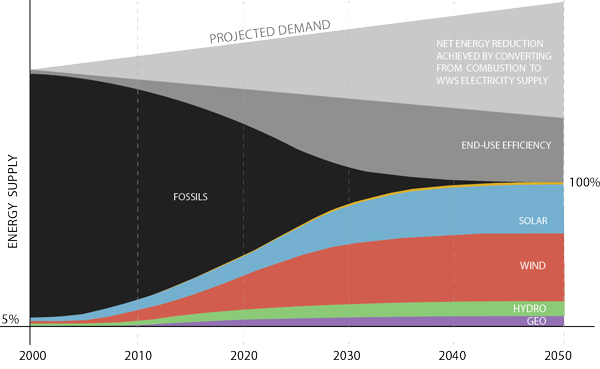 New York State could end fossil-fuel use and generate all of its energy from wind, water and solar power, according to Mark Jacobson.
Image: Graphic by Karl Burkart
New York State could end fossil-fuel use and generate all of its energy from wind, water and solar power, according to Mark Jacobson.
Image: Graphic by Karl Burkart
Three times now, Mark Jacobson has gone out on the same limb. In 2009 he and co-author Mark Delucchi published a cover story in Scientific American that showed how the entire world could get all of its energy—fuel as well as electricity—from wind, water and solar sources by 2030. No coal or oil, no nuclear or natural gas. The tale sounded infeasible—except that Jacobson, from Stanford University, and Delucchi, from the University of California, Davis, calculated just how many hydroelectric dams, wave-energy systems, wind turbines, solar power plants and rooftop photovoltaic installations the world would need to run itself completely on renewable energy.
The article sparked a spirited debate on our Web site, and it also sparked a larger debate between forward-looking energy planners and those who would rather preserve the status quo. The duo went on to publish a detailed study in the journal Energy Policy that also called out numbers for a U.S. strategy. Read more ...

Getting scientists to take ethics seriously: strategies that are probably doomed to failure.
By Janet D. Stemwedel | August 31, 2012Link recommended by Malcolm Dcosta
As part of my day-job as a philosophy professor, I regularly teach a semester-long “Ethics in Science” course at my university. Among other things, the course is intended to help science majors figure out why being ethical might matter to them if they continue on their path to becoming working scientists and devote their careers to the knowledge-building biz.
And, there’s a reasonable chance that my “Ethics in Science” course wouldn’t exist but for strings attached to training grants from federal funding agencies requiring that students funded by these training grants receive ethics training. Read more ...
Carbon pollution up to 2 million pounds a second
By SETH BORENSTEIN | Associated Press – Sun, Dec 2, 2012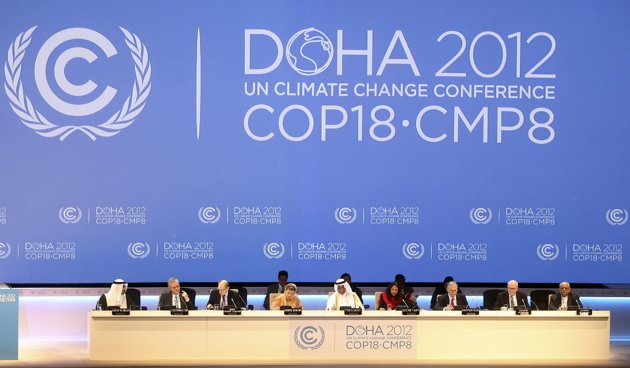 Associated Press/Osama Faisal, File - FILE - This Nov. 26, 2012 file photo shows organizers on stage at the opening ceremony of the 18th United Nations climate change conference in Doha, Qatar.
Associated Press/Osama Faisal, File - FILE - This Nov. 26, 2012 file photo shows organizers on stage at the opening ceremony of the 18th United Nations climate change conference in Doha, Qatar.
WASHINGTON (AP) — The amount of heat-trapping pollution the world spewed rose again last year by 3 percent. So scientists say it's now unlikely that global warming can be limited to a couple of degrees, which is an international goal.
The overwhelming majority of the increase was from China, the world's biggest carbon dioxide polluter. Of the planet's top 10 polluters, the United States and Germany were the only countries that reduced their carbon dioxide emissions.
Last year, all the world's nations combined pumped nearly 38.2 billion tons of carbon dioxide into the air from the burning of fossil fuels such as coal and oil, according to new international calculations on global emissions published Sunday in the journal Nature Climate Change. That's about a billion tons more than the previous year. Read more ...

Doing the Right Thing, Whatever That Is
By ALINA TUGENDPublished: September 21, 2012
Link recommended by Hadi Montakhabi
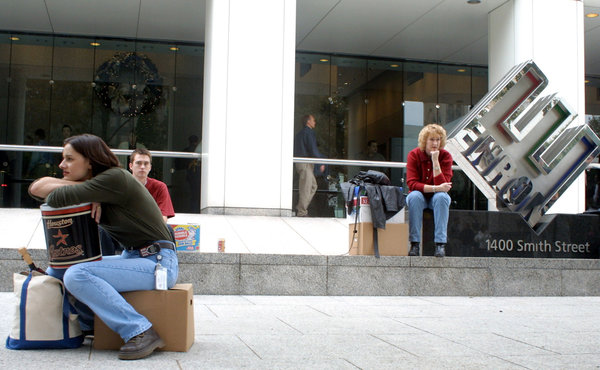 Laid-off employees at Enron’s Houston headquarters on Dec. 3, 2001. Accounting fraud led to the company’s collapse.
Laid-off employees at Enron’s Houston headquarters on Dec. 3, 2001. Accounting fraud led to the company’s collapse.
I RECENTLY found myself in a position where I had some moral qualms about a writing assignment. No, it wasn’t for this publication, and no, I wasn’t being asked to make up quotes or leave out pertinent facts. But I was being asked to phrase things in a way I didn’t feel totally comfortable with.
I spoke to the editor without much luck. I debated what to do. Should I withdraw the article, though it would cause considerable problems to the editor at this late date? Should I ask for my byline to be removed?
In the end, I decided to let the story run. But I vowed I would never write for the publication again.
The incident made me reflect on how things can seem so black and white when you’re outside a situation, and yet so difficult when you’re entangled in it. How do we find a framework for addressing ethical issues in our everyday lives? Read more ...

What about Test Tube Babies?
A set of links recommended by Stacy NguyThirty five years after the first test tube baby was born the debate rages on. An interesting documentary and commentary can be accessed here.
1. PBS film
2. Commentary at the Science magazine

The Ethics of Cloning Methods Revisited
A set of links recommended by Emily LaVoyA team of scientists at the Oregon National Primate Research Center and the Oregon Health & Science University reported an advance in the treatment of inherited genetic disease (Nature, October 24, 2012), which rekindles the discussion about the ethics of cloning methods.
1. The article
2. Commentary by NPR
3. Commentary by NBC
From Calm Leadership, Lasting Change
By NANCY F. KOEHNPublished: October 27, 2012
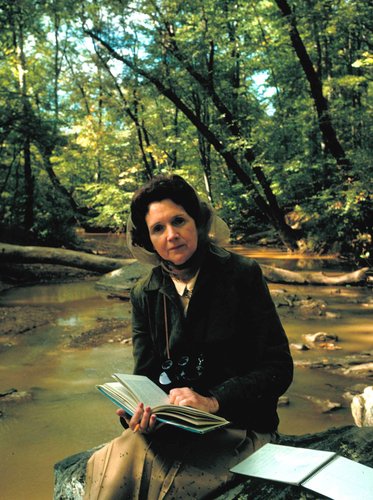
SHE was a slight, soft-spoken woman who preferred walking the Maine shoreline to stalking the corridors of power. And yet Rachel Carson, the author of “Silent Spring,” played a central role in starting the environmental movement, by forcing government and business to confront the dangers of pesticides.
Carson was a scientist with a lyrical bent, who saw it as her mission to share her observations with a wider audience. In the course of her work, she also felt called upon to become a leader — and was no less powerful for being a reluctant one. Read more ...
The Back Page
Why Communicate Science?
By Carl Safina
By “communicate science,” I mean professional scientists explaining something about science to non-scientists. My question is, “Why?” But many scientists are still debating whether we should; many see why they should not.
Communicating science takes time away from research, from teaching, from being home; from something else we need to be doing. The time is not adequately compensated. Doing interviews with reporters, or visiting legislators, has no assigned “impact factor” that boosts vitae-value. Appearing on the radio or TV or in the news, giving talks to civic groups, writing op-eds or articles geared to “popular” audiences, or even a translational book for the general public; all count little, sometimes nothing, towards tenure. Sometimes they actually hurt. Communicating science can be seen as unprofessional. Peers may think less of you. It may seem absurd that many scientists would think it unprofessional to explain science, but that thinking is a fact in academia. And anyway, communicating is the job of communicators such as professional science writers. Read more ...

The Third Culture
Link recommended by Arash HamvatanIn the past few years, the playing field of American intellectual life has shifted, and the traditional intellectual has become increasingly marginalized. A 1950s education in Freud, Marx, and modernism is not a sufficient qualification for a thinking person in the 1990s. Indeed, the traditional American intellectuals are, in a sense, increasingly reactionary, and quite often proudly (and perversely) ignorant of many of the truly significant intellectual accomplishments of our time. Their culture, which dismisses science, is often nonempirical. It uses its own jargon and washes its own laundry. It is chiefly characterized by comment on comments, the swelling spiral of commentary eventually reaching the point where the real world gets lost. Read more ...

Reinventing Ethics
By HOWARD GARDNERLink recommended by Hadi Montakhabi
What’s good and what’s bad? There are plenty of reasons to believe that human nature changes slowly, if at all — all’s still fair in love and war. For millennia, religious believers have attributed our nature to God’s image, as well as to God’s plan. In recent years, evolutionary psychologists peered directly at our forerunners on the savannahs of East Africa; if human beings change, we do so gradually over thousands of years. Given little or nothing new in the human firmament, traditional morality — the “goods” and “bads” as outlined in the Ten Commandments or the Golden Rule — should suffice. Read more ...
Inside the Mind of Worry
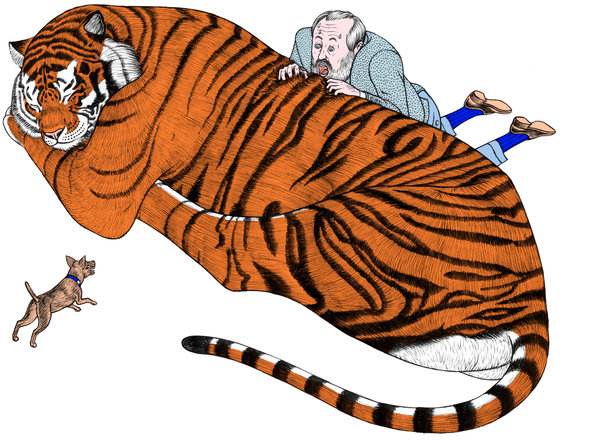
Published: September 28, 2012
Cambridge, Mass.
WE make all sorts of ostensibly conscious and seemingly rational choices when we are aware of a potential risk. We eat organic food, max out on multivitamins and quickly forswear some products (even whole technologies) at the slightest hint of danger. We carry guns and vote for the candidate we think will keep us safe. Yet these choices are far from carefully considered — and, surprisingly often, they contravene reason. What’s more, while our choices about risk invariably feel right when we make them, many of these decisions end up putting us in greater peril. Read more ...
What's really, truly going on with Facebook?
 By John D. Sutter, CNN
By John D. Sutter, CNNupdated 6:09 PM EDT, Tue June 26, 2012 | Filed under: Social Media
(CNN) -- Every week, there's a new Facebook thing to gripe about.
This week, there have been two -- and it's only Tuesday.
On Sunday, it was discovered that the 900 million-person social network was "testing" a feature that would let people see a digital list of the people who were nearby in real life. Called "Find Friends Nearby," the app was pulled down by Tuesday morning after the Internet freaked out. Commenters said things like "Hell to the naw" and "BAD FACEBOOK!!" and generally complaining that the feature, which was difficult to find, much less use, invades privacy and will lead to stalking.
If that's not enough, a company named Friendthem reportedly threatened a lawsuit, saying Facebook stole its idea for the location-aware feature. Apparently, Friendthem would like to share the heat.
Item two: A blogger noticed over the weekend that Facebook, without asking permission, had changed the default e-mail addresses of all of its digital residents to @facebook.com accounts. It's easy enough to change back, as the site Lifehacker and others have detailed, but that little invasion of the hub of digital identity -- the Facebook Timeline -- was enough to make quite a few Facebookers fire back at their digital overlords. Security researchers called the move dangerous. Normal people felt violated. Read more ...
Must Watch: An Out-of-Character Stephen Colbert Interviews Neil deGrasse Tyson
Back in 2010, an out-of-character Stephen Colbert sat down with astrophysicist Neil deGrasse Tyson at Montclair Kimberly Academy to talk for 90 minutes about science, society and the universe.
Can a molecule make us moral?
Paul Zak is professor of Economics and Department Chair and director of the Center for Neuroeconomics Studies at Claremont Graduate University. He's the author of " The Moral Molecule : The Source of Love and Prosperity." Zak spoke at the TED Global conference in July in Edinburgh.
Read more about it on CNN.com











